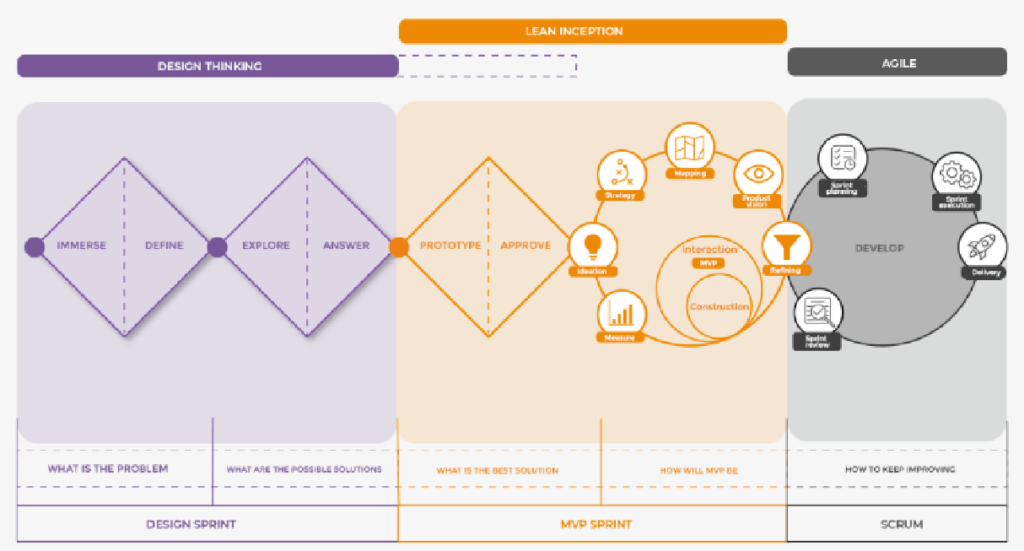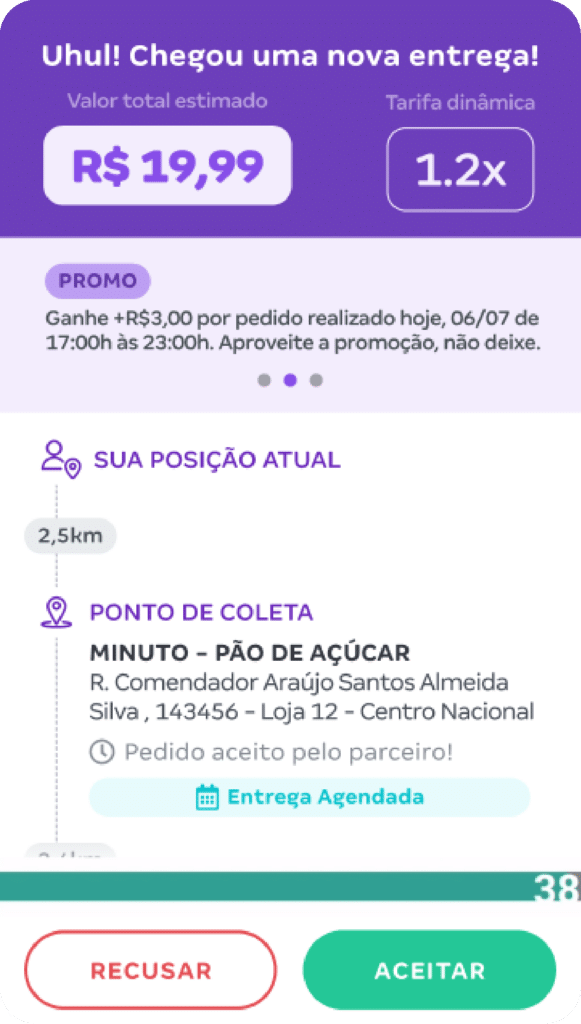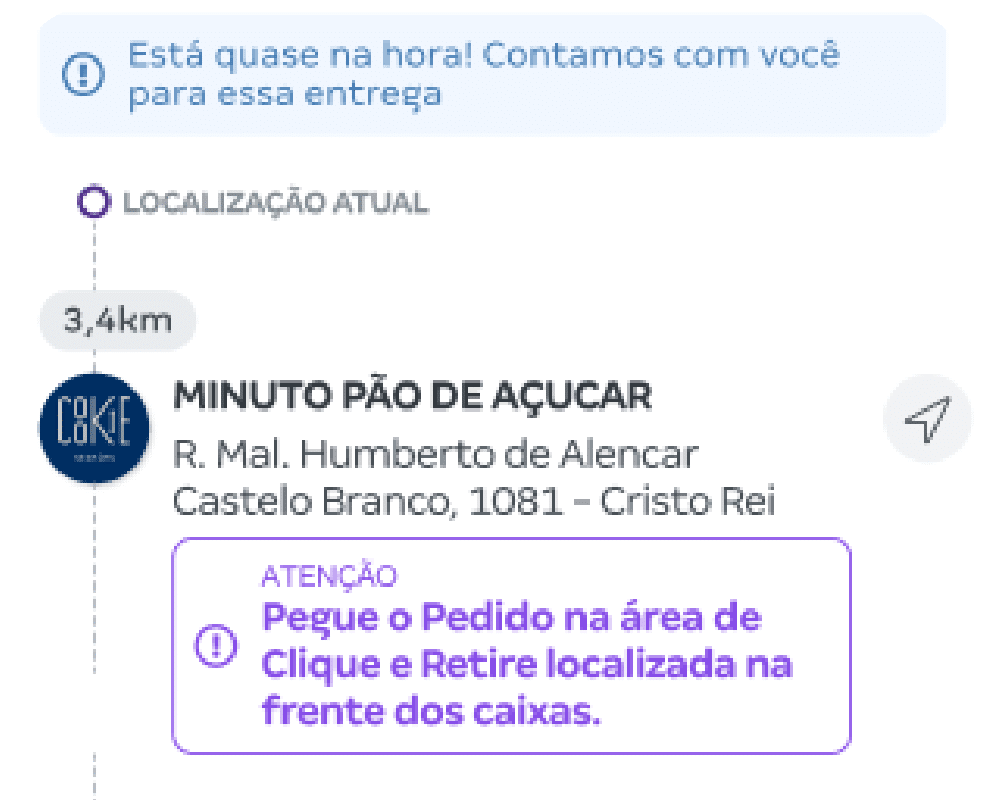Grupo Pão de Açucar was founded in 1948, in São Paulo and has a consistent trajectory. The group has more than 700 physical stores and is the leader in food e-commerce in Brazil.
With a unique model of operations in different distribution segments, the company is part of the lives of millions of Brazilians, always identifying new consumption and behavior trends that allow it to anticipate the needs of its clientele.
Performa_IT acts as a partner of GPA to assist in its purpose of leading the digital transformation of retail, with innovation and dynamism as its main characteristics.

The James Delivery app, currently known as “Pra Já”, is one of GPA’s brands, it was developed to be a delivery platform for various products, which connects customers, delivery people and establishments.
In this scenario, the company is dedicated to discovering new delivery approaches, while mapping opportunities for improvement, aiming to increase operational efficiency and scalability.
In this challenge, we opted for the combination of practices of:
>> BEHAVIORAL SCIENCE;
>> DESIGN THINKING;
>> LEAN INCEPTION.
Thus, we designed a gamification process for the delivery people of “Pra Já!” (James Delivery Person).
Gamification is an approach that aims to create engaging experiences, solve challenges and encourage actions and behaviors through the application of game mechanics and incentives related to this universe, even in situations that are not linked to games.
After identifying the challenges, we carried out the strategic definition, using the CSD Matrix tool to develop hypotheses for the project, to be validated in research and subsequently implemented through an MVP – Minimum Viable Product.
Approaches and Methodologies
Perfoma_IT has its own methodology called IDEA-PAD. The acronym is the combination of the initials of the words: Immerse, Define, Explore, Answer, Prototype, Approve and Develop.
This methodology is based on the principles of Design Thinking, Lean and Agile, and combines these concepts with well-defined steps in order to guide the product design and development process.

The Performa_IT team carried out a deep immersion, using analysis tools such as Personas, Empathy Map, Value Proposition Canvas, in addition to conducting In-Depth Interviews with delivery professionals in the car, motorcycle and bicycle categories. Additionally, they carried out a thorough assessment of competitors, culminating in a comprehensive overview of competitors in the sector.
This immersion phase is intended to validate assumptions, understand the challenges and needs of the interviewees, acquire a deep understanding of the delivery people journeys and identify openings for the implementation of process gamification strategies.
After completing the immersion phase, there is a need to enter the definition stage. During this stage, workshops were conducted in collaboration with project stakeholders, with the purpose of mapping the product’s current journey, known as AS-IS, and thus identifying the problem points and needs of the process. These aspects are then transformed into concrete opportunities for business advancement.
Furthermore, at the same stage, behaviors considered highly advantageous were outlined, in line with the specific demands of the project. Such behaviors were chosen to be encouraged through the application of gamification techniques.
During the exploration phase, taking as a starting point the highlighted opportunities and identified desirable behaviors, an ideation stage was triggered. At this stage, participants proactively engaged in co-creating solutions focused on the challenge presented. Subsequently, following the definition process, modifications or the introduction of new functionalities were planned in the digital product that is part of the delivery people journey.
The final phase focuses on responsive action, aimed at holistically improving the user experience while aligning with agile delivery approaches. At this stage, participants practiced prioritization, highlighting the ideas and features that emerged in the previous stage, using Lean Inception tools, such as Functionality Prioritization and the Sequencer.
Thus, it was possible to define an MVP (Minimum Viable Product) for the project according to the value delivery criteria. The next step included the prototyping stage, in which the screens to be modified in the product were actually designed. With a clickable prototype in hand, we carried out usability tests, aiming to confirm the effectiveness, understanding and application of the new features.
During usability tests, users expressed positive feedback regarding the new approach that incorporates gamification, showing a significant improvement in the experience and interaction with the interface.
Customer satisfaction level: In the NPS survey, the conduct of the project received very favorable evaluations from participants.


“You really have very qualified professionals to make it happen because it is complex. Sometimes you have the tool but you need to understand the business. I felt that Performa_IT contributed a lot, not only with the facilitation but with the discussions, in knowing if it made sense, if what we were putting forward was really a pain, an opportunity, if it had context or not. They were also able to dialogue with business vision, which is sometimes the most difficult thing.”
Av. Antônio Artioli, 570, Bloco Flims B1 – Sala 118
Campinas, São Paulo
13049-253, BR
Av. Dom João II 50, Ed.Mar Vermelho, Parque das Nações
Lisbon 1990-095, PT